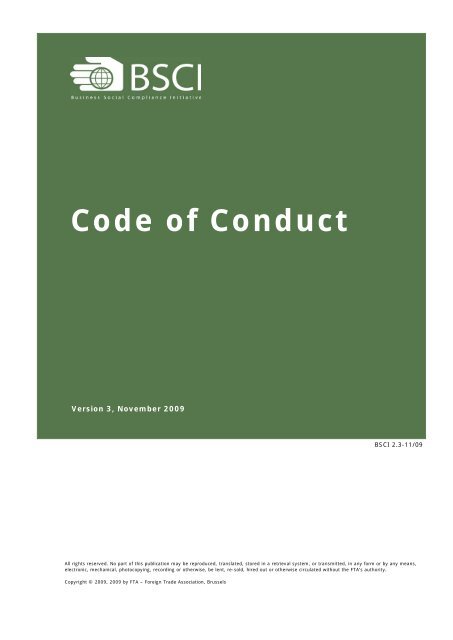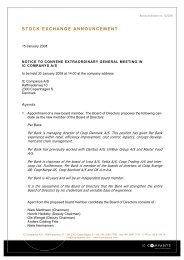BSCI Code of Conduct
BSCI Code of Conduct
BSCI Code of Conduct
You also want an ePaper? Increase the reach of your titles
YUMPU automatically turns print PDFs into web optimized ePapers that Google loves.
<strong>Code</strong> <strong>of</strong> <strong>Conduct</strong><br />
Version 3, November 2009<br />
<strong>BSCI</strong> 2.3-11/09<br />
All rights reserved. No part <strong>of</strong> this publication may be reproduced, translated, stored in a retrieval system, or transmitted, in any form or by any means,<br />
electronic, mechanical, photocopying, recording or otherwise, be lent, re-sold, hired out or otherwise circulated without the FTA’s authority.<br />
Copyright © 2009, 2009 by FTA – Foreign Trade Association, Brussels
<strong>BSCI</strong> <strong>Code</strong> <strong>of</strong> <strong>Conduct</strong><br />
In accordance with the ILO Conventions, the United Nations' Universal Declaration <strong>of</strong> Human Rights,<br />
the UN's Conventions on children's rights and the elimination <strong>of</strong> all forms <strong>of</strong> discrimination against<br />
women, the UN Global Compact and the OECD Guidelines for Multinational Enterprises and other<br />
relevant internationally recognised agreements, the <strong>BSCI</strong> <strong>Code</strong> <strong>of</strong> <strong>Conduct</strong> aims to attain compliance<br />
with certain social and environmental standards. By signing the <strong>BSCI</strong> <strong>Code</strong> <strong>of</strong> <strong>Conduct</strong> companies are,<br />
within their scope <strong>of</strong> influence, committed to acknowledge the social and environmental standards laid<br />
down in this <strong>Code</strong> and to take appropriate measures within their company policy for their<br />
implementation and compliance. Supplier companies, in addition, must ensure that the <strong>Code</strong> <strong>of</strong><br />
<strong>Conduct</strong> is also observed by subcontractors involved in production processes <strong>of</strong> final manufacturing<br />
stages carried out on behalf <strong>of</strong> <strong>BSCI</strong> members.<br />
Within the scope <strong>of</strong> options for action and appropriate measures, these supplier companies have to<br />
aim at the implementation <strong>of</strong> the following criteria in a development approach:<br />
1. Legal Compliance<br />
Compliance with all applicable laws and regulations, industry minimum standards, ILO and UN<br />
Conventions, and any other relevant statutory requirements whichever requirements are more<br />
stringent. In the agricultural context, ILO Convention 110 shall be respected.<br />
2. Freedom <strong>of</strong> Association and the Right to Collective Bargaining<br />
All personnel shall have the right to form, join, and organise trade unions <strong>of</strong> their choice and<br />
to bargain collectively on their behalf with the company. The company shall respect this right,<br />
and shall effectively inform personnel that they are free to join an organisation <strong>of</strong> their<br />
choosing and that their doing so will not result in any negative consequences to them, or<br />
retaliation, from the company. The company shall not in any way interfere with the<br />
establishment, functioning, or administration <strong>of</strong> such workers’ organisations or collective<br />
bargaining. In situations where the right to freedom <strong>of</strong> association and collective bargaining<br />
are restricted under law, the company shall allow workers to freely elect their own<br />
representatives. The company shall ensure that representatives <strong>of</strong> workers and any personnel<br />
engaged in organizing workers are not subjected to discrimination, harassment, intimidation,<br />
or retaliation for reason <strong>of</strong> their being members <strong>of</strong> a union or participating in trade union<br />
activities, and that such representatives have access to their members in the workplace.<br />
- In accordance with ILO Conventions 11, 87, 98, 135 and 154.<br />
3. Prohibition <strong>of</strong> Discrimination<br />
No discrimination shall be tolerated in hiring, remuneration, access to training, promotion,<br />
termination or retirement based on gender, age, religion, race, caste, birth, social background,<br />
disability, ethnic and national origin, nationality, membership in workers’ organisations<br />
including unions, political affiliation or opinions, sexual orientation, family responsibilities,<br />
marital status, or any other condition that could give rise to discrimination.<br />
- In accordance with ILO Conventions 100, 111, 143, 158, 159, 169 and 183.<br />
4. Compensation<br />
Wages paid for regular working hours, overtime hours and overtime differentials shall meet or<br />
exceed legal minimums and/or industry standards. Illegal, unauthorised or disciplinary<br />
deductions from wages shall not be made. In situations in which the legal minimum wage<br />
and/or industry standards do not cover living expenses and provide some additional<br />
disposable income, supplier companies are further encouraged to provide their employees with<br />
adequate compensation to meet these needs. Deductions from wages as a disciplinary<br />
measure are forbidden, unless this is permitted by national law and a freely negotiated<br />
collective bargaining agreement is in force. Supplier companies shall ensure that wage and<br />
benefits composition are detailed clearly and regularly for workers; the supplier company shall<br />
also ensure that wages and benefits are rendered in full compliance with all applicable laws<br />
and that remuneration is rendered in a manner convenient to workers.<br />
© Copyright 2009 The English version is the legally binding one. <strong>BSCI</strong> 2.3-11/09<br />
1
All overtime shall be reimbursed at a premium rate as defined by national law. In countries<br />
where a premium rate for overtime is not regulated by law or a collective bargaining<br />
agreement, personnel shall be compensated for overtime at a premium rate or equal to<br />
prevailing industry standards, whichever is more favourable to workers’ interests.<br />
- In accordance with ILO Conventions 12, 26, 101, 102 and 131.<br />
5. Working Hours<br />
The supplier company shall comply with applicable national laws and industry standards on<br />
working hours and public holidays. The maximum allowable working hours in a week are as<br />
defined by national law but shall not on a regular basis exceed 48 hours and the maximum<br />
allowable overtime hours in a week shall not exceed 12 hours. Overtime hours are to be<br />
worked solely on a voluntary basis and to be paid at a premium rate. In cases where overtime<br />
work is needed in order to meet short-term business demand and the company is party to a<br />
collective bargaining agreement freely negotiated with worker organisations (as defined<br />
above) representing a significant portion <strong>of</strong> its workforce, the company may require such<br />
overtime work in accordance with such agreements. Any such agreement must comply with<br />
the requirements above.<br />
An employee is entitled to at least one free day following six consecutive days worked.<br />
Exceptions to this rule apply only where both <strong>of</strong> the following conditions exist:<br />
a) National law allows work time exceeding this limit;<br />
and<br />
b) A freely negotiated collective bargaining agreement is in force that allows work time<br />
averaging, including adequate rest periods.<br />
- In accordance with ILO Conventions 1 and 14 and ILO Recommendation 116.<br />
6. Workplace Health and Safety<br />
The company shall provide a safe and healthy workplace environment and shall take effective<br />
steps to prevent potential accidents and injury to workers’ health arising out <strong>of</strong>, associated<br />
with, or occurring in the course <strong>of</strong> work, by minimising, so far as is reasonably practicable, the<br />
causes <strong>of</strong> hazards inherent in the workplace environment, and bearing in mind the prevailing<br />
knowledge <strong>of</strong> the industry and <strong>of</strong> any specific hazards.<br />
A clear set <strong>of</strong> regulations and procedures must be established and followed regarding<br />
occupational health and safety, especially the provision and use <strong>of</strong> personal protective<br />
equipment, access to clean toilet facilities, access to potable water and if appropriate, sanitary<br />
facilities for food storage shall be provided. The company shall ensure that any dormitory<br />
facilities provided for personnel are clean, safe, and meet the basic needs <strong>of</strong> the personnel.<br />
All personnel shall have the right to remove themselves from imminent serious danger without<br />
seeking permission from the company.<br />
Workplace practice and conditions in dormitories which violate basic human rights are<br />
forbidden. In particular young workers shall not be exposed to hazardous, unsafe or<br />
unhealthy situations.<br />
- In accordance with ILO Conventions 155, 184 and ILO Recommendations 164 and 190.<br />
In particular, a management representative responsible for the health and safety <strong>of</strong> all<br />
personnel and accountable for the implementation <strong>of</strong> the Health and Safety elements <strong>of</strong> the<br />
<strong>BSCI</strong> shall be appointed. All personnel shall receive regular and recorded health and safety<br />
training, moreover, such training shall be repeated for new and reassigned personnel.<br />
Systems to detect, avoid or respond to potential threats to health and safety <strong>of</strong> all personnel<br />
shall be established.<br />
© Copyright 2009 The English version is the legally binding one. <strong>BSCI</strong> 2.3-11/09<br />
2
7. Prohibition <strong>of</strong> Child Labour<br />
Child labour is forbidden as defined by ILO and United Nations Conventions and/or by national<br />
law. Of these various standards, the one that is the most stringent shall be followed. Any<br />
forms <strong>of</strong> exploitation <strong>of</strong> children are forbidden. Working conditions resembling slavery or<br />
harmful to children's health are forbidden. The rights <strong>of</strong> young workers must be protected. In<br />
the event that children are found to be working in situations which fit the definition <strong>of</strong> child<br />
labour above, policies and written procedures for remediation <strong>of</strong> children found to be working<br />
shall be established and documented by the supplier company. Furthermore, the supplier<br />
company shall provide adequate financial and other support to enable such children to attend<br />
and remain in school until no longer a child.<br />
The company may employ young workers, but where such young workers are subject to<br />
compulsory education laws, they may work only outside <strong>of</strong> school hours. Under no<br />
circumstances shall any young worker’s school, work, and transportation time exceed a<br />
combined total <strong>of</strong> 10 hours per day, and in no case shall young workers work more than 8<br />
hours a day. Young workers may not work during night hours.<br />
- In accordance with ILO Conventions 10, 79, 138, 142 and 182 and Recommendation 146.<br />
8. Prohibition <strong>of</strong> Forced and compulsory Labour and Disciplinary Measures<br />
All forms <strong>of</strong> forced labour, such as lodging deposits or the retention <strong>of</strong> identity documents<br />
from personnel upon commencing employment, are forbidden as is prisoner labour that<br />
violates basic human rights.<br />
Neither the company nor any entity supplying labour to the company shall withhold any part<br />
<strong>of</strong> any personnel’s salary, benefits, property, or documents in order to force such personnel to<br />
continue working for the company.<br />
Personnel shall have the right to leave the workplace premises after completing the standard<br />
workday, and be free to terminate their employment provided that they give reasonable<br />
notice to their employer.<br />
Neither the company nor any entity supplying labour to the company shall engage in or<br />
support trafficking in human beings.<br />
The company shall treat all personnel with dignity and respect. The company shall not engage<br />
in or tolerate the use <strong>of</strong> corporal punishment, mental or physical coercion and verbal abuse <strong>of</strong><br />
personnel.<br />
- In accordance with ILO Conventions 29 and 105.<br />
9. Environment and Safety Issues<br />
Procedures and standards for waste management, handling and disposure <strong>of</strong> chemicals and<br />
other dangerous materials, emissions and effluent treatment must meet or exceed minimum<br />
legal requirements.<br />
10. Management Systems<br />
The supplier company shall define and implement a policy for social accountability, a<br />
management system to ensure that the requirements <strong>of</strong> the <strong>BSCI</strong> <strong>Code</strong> <strong>of</strong> <strong>Conduct</strong> can be met<br />
as well as establish and follow an anti-bribery / anti-corruption policy in all <strong>of</strong> their business<br />
activities. Management is responsible for the correct implementation and continuous<br />
improvement by taking corrective measures and periodical review <strong>of</strong> the <strong>Code</strong> <strong>of</strong> <strong>Conduct</strong>, as<br />
well as the communication <strong>of</strong> the requirements <strong>of</strong> the <strong>Code</strong> <strong>of</strong> <strong>Conduct</strong> to all employees. It<br />
shall also address employees’ concerns <strong>of</strong> non compliance with this <strong>Code</strong> <strong>of</strong> <strong>Conduct</strong>.<br />
The following annexes are integral part <strong>of</strong> this <strong>Code</strong> <strong>of</strong> <strong>Conduct</strong>:<br />
- Declaration <strong>of</strong> the supplier company<br />
- Terms <strong>of</strong> implementation<br />
- Consequences <strong>of</strong> Non-Compliance<br />
Brussels, November 2009<br />
© Copyright 2009 The English version is the legally binding one. <strong>BSCI</strong> 2.3-11/09<br />
3
Declaration<br />
Declaration <strong>of</strong> Liability Regarding Compliance with the <strong>BSCI</strong> <strong>Code</strong> <strong>of</strong> <strong>Conduct</strong><br />
We, the undersigned hereby confirm:<br />
� That we have received and taken due note <strong>of</strong> the <strong>BSCI</strong> <strong>Code</strong> <strong>of</strong> <strong>Conduct</strong> <strong>of</strong> November 2009, the<br />
<strong>BSCI</strong> System: Rules and Functioning, and the Management Manual.<br />
� That we are aware <strong>of</strong> all relevant laws and regulations <strong>of</strong> the country or countries in which our<br />
company operates.<br />
� That we will inform �Name <strong>of</strong> <strong>BSCI</strong> Member� in case <strong>of</strong> conflict between provisions <strong>of</strong> the <strong>BSCI</strong><br />
<strong>Code</strong> <strong>of</strong> <strong>Conduct</strong> and any applicable laws or regulations in our countries <strong>of</strong> operation.<br />
� That we will observe and conform to the <strong>BSCI</strong> <strong>Code</strong> <strong>of</strong> <strong>Conduct</strong> in its entirety based on a<br />
development oriented approach and without amendment or abrogation.<br />
� That we will inform all <strong>of</strong> our subcontractors <strong>of</strong> the contents and requirements <strong>of</strong> the <strong>BSCI</strong> <strong>Code</strong> <strong>of</strong><br />
<strong>Conduct</strong>, and that we will ensure that they also comply with the provisions incorporated therein.<br />
� That �Name <strong>of</strong> <strong>BSCI</strong> Member� and any organisations acting on its behalf may carry out audits with<br />
or without notice at our business premises and the business premises <strong>of</strong> our subcontractors at any<br />
time.<br />
Furthermore:<br />
� We agree to carry out a self-assessment <strong>of</strong> our social performance, and that <strong>of</strong> our subcontractors<br />
upon the request <strong>of</strong> �Name <strong>of</strong> <strong>BSCI</strong> Member�, and to submit the details <strong>of</strong> these assessments to<br />
�Name <strong>of</strong> <strong>BSCI</strong> Member� for evaluation. This will take the form <strong>of</strong> a completed <strong>BSCI</strong> selfassessment<br />
questionnaire.<br />
� We shall notify �Name <strong>of</strong> <strong>BSCI</strong> Member� <strong>of</strong> the location <strong>of</strong> all business premises used for the<br />
production <strong>of</strong> goods and / or delivery <strong>of</strong> services for � Name <strong>of</strong> <strong>BSCI</strong> Member�. We guarantee that<br />
the production <strong>of</strong> goods and / or delivery <strong>of</strong> services for �Name <strong>of</strong> <strong>BSCI</strong> Member� is carried out<br />
exclusively at the locations we have indicated. We understand that failure to inform �Name <strong>of</strong> <strong>BSCI</strong><br />
Member� <strong>of</strong> the location where work for its products and / or services are carried out is adequate<br />
justification for the immediate and unconditional termination <strong>of</strong> all business and contractual<br />
relationships.<br />
� We will use the <strong>BSCI</strong> management manual exclusively for purposes relating to business and<br />
monitoring activities <strong>of</strong> the <strong>BSCI</strong> and �Name <strong>of</strong> <strong>BSCI</strong> Member� . We will not allow any third parties<br />
not involved in the <strong>BSCI</strong> compliance/monitoring process to have access to this manual.<br />
Date ................................................................................... Name <strong>of</strong> company .......................................................................<br />
Signature ........................................................................ Company Stamp/Seal<br />
Name ................................................................................. Address ............................................................................................<br />
This document must be signed by a duly authorised representative <strong>of</strong> the company and returned to<br />
�Name <strong>of</strong> <strong>BSCI</strong> Member�.<br />
© Copyright 2009 The English version is the legally binding one. <strong>BSCI</strong> 2.3-11/09<br />
4
Terms <strong>of</strong> implementation<br />
All suppliers are obliged to take the measures necessary to implement and monitor the<br />
<strong>BSCI</strong> <strong>Code</strong> <strong>of</strong> <strong>Conduct</strong>:<br />
Management Responsibilities:<br />
� by informing management and suppliers about the content <strong>of</strong> the <strong>BSCI</strong> <strong>Code</strong> <strong>of</strong> <strong>Conduct</strong>.<br />
� by establishing where responsibility lies within the company's organisation regarding all <strong>BSCI</strong> <strong>Code</strong><br />
<strong>of</strong> <strong>Conduct</strong> issues.<br />
� by appointing one or more management employees to be responsible for implementation <strong>of</strong> the<br />
<strong>BSCI</strong> <strong>Code</strong> <strong>of</strong> <strong>Conduct</strong>.<br />
� by monitoring company compliance with the <strong>BSCI</strong> <strong>Code</strong> <strong>of</strong> <strong>Conduct</strong> and implementing necessary<br />
changes at its facilities.<br />
Employee Awareness:<br />
� by giving a statement <strong>of</strong> their support for the principles <strong>of</strong> the <strong>BSCI</strong> <strong>Code</strong> <strong>of</strong> <strong>Conduct</strong> to their<br />
employees and by informing and instructing their employees and those <strong>of</strong> their subcontractors<br />
regarding the contents <strong>of</strong> the <strong>BSCI</strong> <strong>Code</strong> <strong>of</strong> <strong>Conduct</strong>. The company must have the <strong>BSCI</strong> <strong>Code</strong> <strong>of</strong><br />
<strong>Conduct</strong> translated in its entirety into the appropriate local language(s) and have it displayed in a<br />
prominent position at its facility and other premises. Employees must also receive verbal<br />
orientation and information regarding the <strong>Code</strong> <strong>of</strong> <strong>Conduct</strong> in a language they understand.<br />
� by regularly training employees in workplace safety and on the impact <strong>of</strong> their activity on society<br />
and the environment.<br />
Record-Keeping:<br />
� by keeping records <strong>of</strong> the names, ages, working hours and the wages paid to all employees and<br />
making these documents available to <strong>BSCI</strong> auditors on request.<br />
� by documenting the location <strong>of</strong> dangerous materials and other potential hazards<br />
� by monitoring and maintaining safety equipment and materials<br />
� by keeping up to date documentation regarding relevant statutory requirements and regulations.<br />
Complaints and Corrective Action:<br />
� by appointing an employee responsible for handling complaints related to <strong>BSCI</strong> issues.<br />
� by documenting and investigating complaints from employees or third parties related to <strong>BSCI</strong><br />
issues, and reporting on their substance and any necessary corrective measures arising from them.<br />
� by making the resources available to implement necessary corrective measures.<br />
� by refraining from dismissals or other disciplinary measures against employees who pass on<br />
information regarding compliance with the <strong>BSCI</strong> <strong>Code</strong> <strong>of</strong> <strong>Conduct</strong>.<br />
Suppliers and Sub-Contractors:<br />
� by making the introduction <strong>of</strong> social standards and compliance with the <strong>BSCI</strong> <strong>Code</strong> <strong>of</strong> <strong>Conduct</strong> a<br />
condition <strong>of</strong> all contracts into which it enters with suppliers.<br />
� by asking suppliers to report regularly about their progress in implementing the <strong>BSCI</strong> <strong>Code</strong> <strong>of</strong><br />
<strong>Conduct</strong>.<br />
Monitoring:<br />
� by providing <strong>BSCI</strong> Members with relevant information about their activities and all production sites.<br />
� by allowing audits <strong>of</strong> their business premises and activities and those <strong>of</strong> their subcontractors to be<br />
carried out at any time with or without prior notice by organisations acting on behalf <strong>of</strong> <strong>BSCI</strong><br />
members.<br />
© Copyright 2009 The English version is the legally binding one. <strong>BSCI</strong> 2.3-11/09<br />
5
Consequences <strong>of</strong> Non-Compliance<br />
If a supplier fails to meet the requirements <strong>of</strong> the <strong>BSCI</strong> <strong>Code</strong> <strong>of</strong> <strong>Conduct</strong>, and if no solutions can be<br />
agreed upon and implemented within a reasonable amount <strong>of</strong> time, a <strong>BSCI</strong> member may choose to<br />
halt current production, cancel corresponding contracts, suspend future contracts and/or terminate<br />
the business relationship with the non-conforming supplier. If an audit reveals less than full<br />
compliance with the <strong>BSCI</strong> <strong>Code</strong> <strong>of</strong> <strong>Conduct</strong>, the supplier must take the prescribed corrective actions<br />
without delay. The period <strong>of</strong> time the supplier has to implement these corrective measures will be<br />
agreed upon with the auditors, but may not exceed twelve months. If a supplier excluded in the past<br />
on grounds <strong>of</strong> non-compliance shows later that it can comply fully with the <strong>BSCI</strong> <strong>Code</strong> <strong>of</strong> <strong>Conduct</strong>,<br />
there is, in principle, no reason why a business relationship cannot be resumed.<br />
© Copyright 2009 The English version is the legally binding one. <strong>BSCI</strong> 2.3-11/09<br />
6








